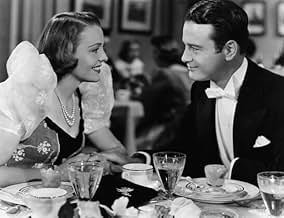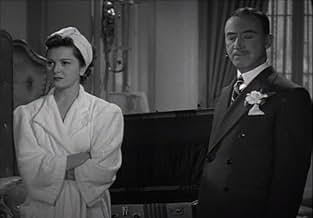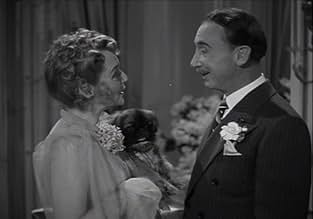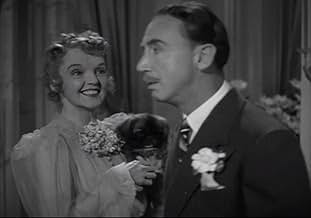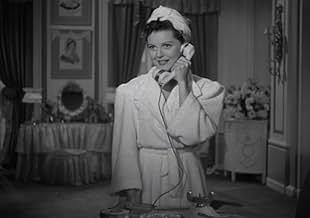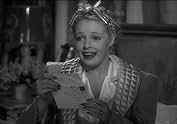A drunken college boy invites a taxi dancer to spend the weekend at his snobbish school.A drunken college boy invites a taxi dancer to spend the weekend at his snobbish school.A drunken college boy invites a taxi dancer to spend the weekend at his snobbish school.
- Awards
- 1 win total
Peter Lind Hayes
- Skel
- (as Peter Hayes)
Ernie Alexander
- Parking Attendant
- (uncredited)
Rod Bacon
- College Boy
- (uncredited)
Lee Bennett
- College Boy
- (uncredited)
Featured reviews
How pretty, sexy, and vivacious Lana Turner was, and she's shown to great advantage in "These Glamour Girls," a 1939 film about a weekend of house parties at an upper-class college. Turner plays a Jane, a taxi dancer at the Joy Lane Dance Hall who meets Phil (Lew Ayres), a college student from an old family who's at the Joy Lane slumming with his pals. While drunk, he invites her to the big weekend at Knightsbridge College. When she arrives, he's forgotten who she is and he already has a date. He convinces her to stay anyway, and while having a good time, she gets a glimpse of what the upper class is really like and what's important to them: background, the right schools, social standing, and money. And don't forget the booze.
This is an okay story with some good performances from Turner, Ayres, Richard Carlson, Marsha Hunt, Ann Rutherford, Tom Brown, Jane Bryan, and Anita Louise. Rutherford's with a man who doesn't want her, and Louise is the resident bitch. Bryan is dating Ayres, but it's obvious she's in love with Carlson. Marsha Hunt plays Betty, a 23-year-old still hanging with the college crowd in the hopes of nabbing a man. When she overhears someone say she should get married soon before she misses the boat, she panics. It's themes like this in the '30s-'50s that are hard to stomach, and frankly, it brings down this film. The resolution of the Betty arc is very out of place.
Most of the actors were in their twenties, but Turner was only 18 and Ayres was 30, a little old for a college kid - but he was always a very likable actor. Except for Turner, whose charisma leaps out of the screen, there isn't anything special about "These Glamour Girls."
This is an okay story with some good performances from Turner, Ayres, Richard Carlson, Marsha Hunt, Ann Rutherford, Tom Brown, Jane Bryan, and Anita Louise. Rutherford's with a man who doesn't want her, and Louise is the resident bitch. Bryan is dating Ayres, but it's obvious she's in love with Carlson. Marsha Hunt plays Betty, a 23-year-old still hanging with the college crowd in the hopes of nabbing a man. When she overhears someone say she should get married soon before she misses the boat, she panics. It's themes like this in the '30s-'50s that are hard to stomach, and frankly, it brings down this film. The resolution of the Betty arc is very out of place.
Most of the actors were in their twenties, but Turner was only 18 and Ayres was 30, a little old for a college kid - but he was always a very likable actor. Except for Turner, whose charisma leaps out of the screen, there isn't anything special about "These Glamour Girls."
Minor B of more interest for its cast of up and coming future stars than the ordinary script.
Lana saddled with an unbecoming hairstyle is clearly being groomed for the big time. She still hadn't finished the transformation from the girlish Judy Turner to the sleek Lana but she is on her way, she's bright and spunky.
The film's lower budget origins are obvious in the fact that many of the plot points are teased along and then they and the actors involved simply disappear from the narrative.
The film's most intriguing character, the insecure and lost Betty, is assigned to the best actress of the bunch Marsha Hunt but unfortunately treated as a secondary player. Her actions are never fully explained and the aftermath of her story is completely ignored however she makes more of an impression than any of the other performers and you miss her when she's not on the screen. Actually her story could have made an interesting film on its own.
Slight but worth catching once for the cast.
Lana saddled with an unbecoming hairstyle is clearly being groomed for the big time. She still hadn't finished the transformation from the girlish Judy Turner to the sleek Lana but she is on her way, she's bright and spunky.
The film's lower budget origins are obvious in the fact that many of the plot points are teased along and then they and the actors involved simply disappear from the narrative.
The film's most intriguing character, the insecure and lost Betty, is assigned to the best actress of the bunch Marsha Hunt but unfortunately treated as a secondary player. Her actions are never fully explained and the aftermath of her story is completely ignored however she makes more of an impression than any of the other performers and you miss her when she's not on the screen. Actually her story could have made an interesting film on its own.
Slight but worth catching once for the cast.
What a hidden little gem. Drunken rich college boy (Lew Ayres) invites working class girl (Lana Turner) to a big college dance. Once she arrives there, however, he has sobered up and forgotten all about her. Despite this and despite being treated badly by the snobby girls, Lana stays and shows them all up.
A delightful movie with a great cast full of beautiful young starlets. Lana Turner is gorgeous and her curvy figure is certainly different than most of the other girls. Her personality shines in this movie as well. She's really likable. Lovely Jane Bryan plays one of the nicer rich girls. Jane has a crush on a working class boy herself. Anita Louise is the viper of the bunch; the head mean girl. Ann Rutherford, adorable as ever, is the slow but cute one. Marsha Hunt plays a girl who is a little older than the others and is trying too hard to fit in. She's quite good to watch. Lew Ayres is charming, even when he's being a jerk. Richard Carlson plays the object of Jane Bryan's affections. Mostly lightweight but some darker parts as well. On the whole, lots of fun.
A delightful movie with a great cast full of beautiful young starlets. Lana Turner is gorgeous and her curvy figure is certainly different than most of the other girls. Her personality shines in this movie as well. She's really likable. Lovely Jane Bryan plays one of the nicer rich girls. Jane has a crush on a working class boy herself. Anita Louise is the viper of the bunch; the head mean girl. Ann Rutherford, adorable as ever, is the slow but cute one. Marsha Hunt plays a girl who is a little older than the others and is trying too hard to fit in. She's quite good to watch. Lew Ayres is charming, even when he's being a jerk. Richard Carlson plays the object of Jane Bryan's affections. Mostly lightweight but some darker parts as well. On the whole, lots of fun.
This film is a good example of MGM's early attempts to establish a screen persona for Lana Turner. Her role here as a dance hall hostess is similar to the rags-to-riches roles that Joan Crawford had successfully played early in her own career a decade earlier. However, Lana Turner just wasn't made to wear rags, and it wasn't until MGM put her into satins and jewels that audiences really responded.
This film is an entertaining mix of romantic comedy and social class commentary. The university town ("Kingsford") is obviously patterned after Princeton, NJ. (The eating clubs that host the prom in the film are still very much thriving institutions at Princeton.) There's a strong supporting cast and the condescending attitudes of some of the upper crust girls toward Turner is refreshingly realistic. (Amusingly, Turner apparently has red hair in this black-and-white film. Other characters refer to her as "Red").
This film is an entertaining mix of romantic comedy and social class commentary. The university town ("Kingsford") is obviously patterned after Princeton, NJ. (The eating clubs that host the prom in the film are still very much thriving institutions at Princeton.) There's a strong supporting cast and the condescending attitudes of some of the upper crust girls toward Turner is refreshingly realistic. (Amusingly, Turner apparently has red hair in this black-and-white film. Other characters refer to her as "Red").
As a work of art, there is not much here - a poor cousin to "My Man Godfrey." As a "teaching moment," however, this film is a zinger. It tries to entertain but also to deliver a social message. It does so, so maladroitly that it ends up a perfect mirror of a mixed-up society, an almost-post-Depression society that was itself badly muddled and conflicted.
We are presented with a thoroughly obnoxious set of idle, moneyed, entitled, frivolous and uncaring young people. So much for a caricature of the upper classes. Ah, but then there is the heartwarming contrast with the poor but honest working-class heroine (Lana Turner - not a bad performance, but not quite convincing). So much for the clichéd social conflict. What lesson are we, the almost-post-Depression theater audience, intended to draw from this? Of course, the lesson is that we are all one. Even the obnoxious rich are not so bad. They will see the light. The rich boy and poor girl will marry. But do they? Not really. The rich kid loses his fortune. Not until then does he accept his love for the dime-a-dance girl. The once-rich-but-now-in-reduced-circumstances girl marries the poor student who must work his way through college. No one steps out of his or her economic sphere. The rest of the rich kids go off to continue their obnoxious, parasitic life-style. All is right with the world. No one is really bad. Smile. It is indeed extraordinary that the uber-rich kid's father is found to be a criminal. He has defrauded perhaps thousands of investors (probably including many poor investors) in his hedge-fund or Ponzi scheme; he's a veritable Bernie Madoff. Yet we are not expected to blame him or even to dislike him. "Thanks, dad, for having given me a good start in life," says his non-reproachful son. Capitalism is a tough business, not for the faint-hearted. It's all OK. The poor are virtuous. The rich are irritating but ultimately sympathetic. That is the lesson of "Glamour Girls." It's a message Hollywood was eager to deliver in 1939, and America was happy to receive. Maybe Hollywood was right. As the 19th century humorist Josh Billings, a friend of Mark Twain, put it, defining the American spirit: "Wealth won't make a man virtuous, but there ain't anybody who wants to be poor just for the purpose of being good."
As a social document, a relic of its time, the movie is revealing. As a film, a work of art, it is less than captivating - with one exception. That exception makes the whole thing worth seeing: the performance of Marsha Hunt. Her character, Martha, is the only one with depth. Her acting is the only one with profundity. Just watch her suicide scene. Watch her face as she drives toward her fatal moment. She registers nearly a dozen shifting emotions, all razor sharp and all without speaking a word, all in the space of a minute of screen time. First we see desperation as she speeds the car unheeding toward nowhere; then sadness; then surprise as she spots the train alongside; then a look of realization as the idea of what she can do strikes her; then happiness as it sinks in; then literal glee as she contemplates it; then fierce determination as she hits the accelerator; fear takes over as she reaches the crossing, fear as she nervously, fumblingly, lights a last cigarette; then glee again, a look of triumph as she stares at the sleeping drunken frat boy beside her - he will go down too. It is extraordinary acting. Marsha Hunt - I've seen her interviewed - said she didn't care to be a star. She wanted to be a character actress. She became one of the best. One year later she played the gawky, tone-deaf sister in "Pride and Prejudice." After that she played the heroic but devastated victim of Nazi oppression in "None Shall Return." She portrayed a nasty, conniving home-wrecker in "Smash-Up," then a gentle, conflicted lover in "Raw Deal." If nothing else, "Glamour Girls" gives us one sublime actress at her peak.
We are presented with a thoroughly obnoxious set of idle, moneyed, entitled, frivolous and uncaring young people. So much for a caricature of the upper classes. Ah, but then there is the heartwarming contrast with the poor but honest working-class heroine (Lana Turner - not a bad performance, but not quite convincing). So much for the clichéd social conflict. What lesson are we, the almost-post-Depression theater audience, intended to draw from this? Of course, the lesson is that we are all one. Even the obnoxious rich are not so bad. They will see the light. The rich boy and poor girl will marry. But do they? Not really. The rich kid loses his fortune. Not until then does he accept his love for the dime-a-dance girl. The once-rich-but-now-in-reduced-circumstances girl marries the poor student who must work his way through college. No one steps out of his or her economic sphere. The rest of the rich kids go off to continue their obnoxious, parasitic life-style. All is right with the world. No one is really bad. Smile. It is indeed extraordinary that the uber-rich kid's father is found to be a criminal. He has defrauded perhaps thousands of investors (probably including many poor investors) in his hedge-fund or Ponzi scheme; he's a veritable Bernie Madoff. Yet we are not expected to blame him or even to dislike him. "Thanks, dad, for having given me a good start in life," says his non-reproachful son. Capitalism is a tough business, not for the faint-hearted. It's all OK. The poor are virtuous. The rich are irritating but ultimately sympathetic. That is the lesson of "Glamour Girls." It's a message Hollywood was eager to deliver in 1939, and America was happy to receive. Maybe Hollywood was right. As the 19th century humorist Josh Billings, a friend of Mark Twain, put it, defining the American spirit: "Wealth won't make a man virtuous, but there ain't anybody who wants to be poor just for the purpose of being good."
As a social document, a relic of its time, the movie is revealing. As a film, a work of art, it is less than captivating - with one exception. That exception makes the whole thing worth seeing: the performance of Marsha Hunt. Her character, Martha, is the only one with depth. Her acting is the only one with profundity. Just watch her suicide scene. Watch her face as she drives toward her fatal moment. She registers nearly a dozen shifting emotions, all razor sharp and all without speaking a word, all in the space of a minute of screen time. First we see desperation as she speeds the car unheeding toward nowhere; then sadness; then surprise as she spots the train alongside; then a look of realization as the idea of what she can do strikes her; then happiness as it sinks in; then literal glee as she contemplates it; then fierce determination as she hits the accelerator; fear takes over as she reaches the crossing, fear as she nervously, fumblingly, lights a last cigarette; then glee again, a look of triumph as she stares at the sleeping drunken frat boy beside her - he will go down too. It is extraordinary acting. Marsha Hunt - I've seen her interviewed - said she didn't care to be a star. She wanted to be a character actress. She became one of the best. One year later she played the gawky, tone-deaf sister in "Pride and Prejudice." After that she played the heroic but devastated victim of Nazi oppression in "None Shall Return." She portrayed a nasty, conniving home-wrecker in "Smash-Up," then a gentle, conflicted lover in "Raw Deal." If nothing else, "Glamour Girls" gives us one sublime actress at her peak.
Did you know
- TriviaFirst film where Lana Turner receives top billing.
- Quotes
Jane Thomas: Listen, you wisecracking, bad-mouthing glamour girl. I've had all your kind of friend that I can use. Why, I wouldn't breathe the same air with you and your pedigree polo shirts for another five minutes.
- ConnectionsFeatured in Discovering Film: Lana Turner (2015)
- SoundtracksLoveliness
(1939)
Music by Edward Ward
Lyrics by Bob Wright and Chet Forrest
Played during the opening credits
Sung by Dale Fellows (uncredited) at the social
Hummed by Lana Turner (uncredited)
Played as background music often
Details
- Release date
- Country of origin
- Language
- Also known as
- Taksi igračica
- Filming locations
- Production company
- See more company credits at IMDbPro
Box office
- Budget
- $403,000 (estimated)
- Runtime
- 1h 19m(79 min)
- Color
- Aspect ratio
- 1.37 : 1
Contribute to this page
Suggest an edit or add missing content


